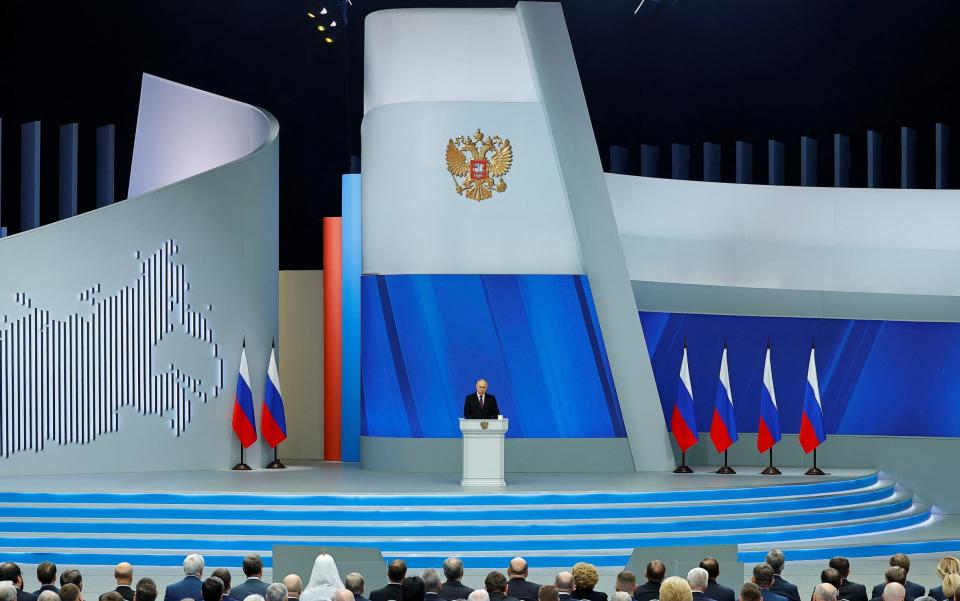Putin threatens Nato with nuclear war if it sends troops to Ukraine
- Oops!Something went wrong.Please try again later.
- Oops!Something went wrong.Please try again later.
Vladimir Putin has threatened to strike Nato countries with nuclear weapons if the alliance sends troops to Ukraine.
The Russian president said soldiers being deployed to Kyiv could provoke a nuclear war and the “destruction of civilisation”.
Addressing the Kremlin in his annual state of the nation speech, Putin also boasted that Russian troops were advancing “in a number of areas” across the front line in Ukraine as Kyiv runs low on shells and critical equipment.
His nuclear threats come after Emmanuel Macron, the French president, said he would not rule out Nato putting boots on the ground, sparking controversy and division within the alliance.
Mr Macron had said Nato should do “everything needed so Russia cannot win the war”.
Putin used his speech, just weeks before the Russian presidential election, to tell Kyiv’s allies that Russian “strategic nuclear forces” are “in a state of full readiness for guaranteed use”.
“They should eventually realise that we also have weapons that can hit targets on their territory,” he said. “Everything that the West comes up with creates the real threat of a conflict with the use of nuclear weapons, and thus the destruction of civilisation.”
Putin has made nuclear threats in the past, but has cooled his rhetoric in recent months. After his speech, he was accused of “nuclear sabre-rattling” in a bid to discourage Ukraine’s allies from deepening their involvement in the war.
Russia has made a number of key gains in the war, taking the key city of Avdiivka earlier this month.
Its troops are recently thought to have entered the village of Robotyne in the south – one of a handful of hard-won gains from Ukraine’s s counter-offensive last summer.
Tobias Ellwood, a senior MP who sits on the defence select committee, told The Telegraph: “Putin’s latest nuclear sabre-rattling is an attempt to leverage visible discord within the West about how support for Ukraine progresses.
“We should not be spooked by Moscow and remain totally committed to pushing Russian forces out of Ukraine.”
Prof Andrew Futter, who specialises in global nuclear politics, said Putin’s comments were likely part of an “ongoing strategy” to drain Western support for Kyiv by issuing “vague nuclear threats”.
It was clearly a warning shot to Mr Macron and may be linked to inaction in the US Congress, where President Joe Biden has struggled to force through a $60 billion (£47.6 billion) aid package for Ukraine, he added.
“Given the implications, nuclear rhetoric and threats have to be taken seriously, but this isn’t the first time that this has happened over the past two years,” Prof Rutter said.
“This is therefore probably part of Russian signalling about certain red lines. However, Putin and those around him are fully aware that the West is also nuclear-armed, and any type of nuclear use by Russia is very unlikely to go unpunished.”
Putin’s speech comes after leaked Russian military files showed his forces had rehearsed using tactical nuclear weapons against major world powers – including China, an ally.
The classified papers, first reported by The Financial Times, showed the criteria for a nuclear response is lower than it has ever publicly admitted. This includes an enemy incursion on Russian territory and 20 per cent of its ballistic missile submarines being destroyed.
Last week Putin took a widely publicised flight in a nuclear Tu-160M bomber in what was perceived as another implicit threat to the West about Russia’s nuclear capabilities.
Dr Laura Considine, who teaches international relations at Leeds University, said it was “fundamentally unknowable” if Putin would deploy nuclear weapons in response to Nato troops in Ukraine, but warned the threat should be taken seriously.
“I think this is within a wider context of nuclear signalling as a means of trying to influence decision-making of others, particularly Western and Nato action,” she said.
“It’s worth thinking about the specific purpose of these instances of nuclear threats. This one seems to be linked particularly to the idea that President Macron suggested of Nato troops on the ground in Ukraine.”
Elsewhere in Putin’s speech on Thursday, he claimed Nato was attempting to expand eastwards and that Russia must not repeat its mistakes of the Cold War.
“We understand that the West is trying to drag us into an arms race,” he said. “They are trying to wear us down, to repeat the trick they succeeded with the Soviet Union in the 1980s.
“Therefore, our task is to develop the defence-industrial complex in such a way as to increase the scientific, technological and industrial potential of the country.
“We need to distribute resources as rationally as possible and build an efficient economy of the armed forces, to achieve the maximum for every rouble of defence expenditures.”

Putin has no realistic rival for the presidency ahead of the Russian elections, which begin on March 15.
Alexei Navalny, the imprisoned opposition leader, died in mysterious circumstances in an Arctic penal colony earlier this month, prompting condemnation of the Russian president by the West.
Mr Navalny’s funeral is being held in Moscow on Friday in what is likely to be a challenge for authorities who have clamped down on public displays of mourning.
His family was only allowed access to his body last week after an eight-day wait, with his mother saying she had been threatened into burying her son in secret.

